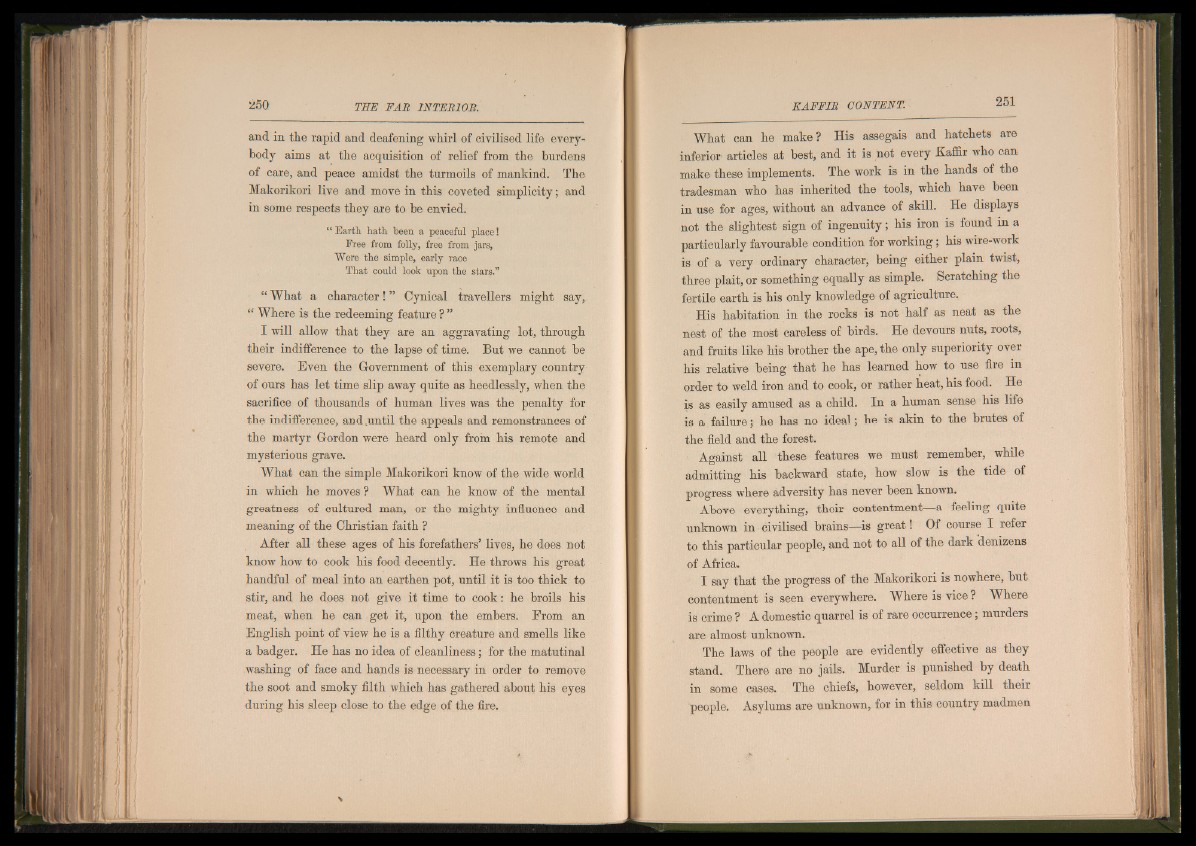
and in the rapid and deafening whirl of civilised life everybody
aims at the acquisition of relief from the burdens
of care, and peace amidst the turmoils of mankind. The
Makorikori live and move in this coveted simplicity; and
in some respects they are to be envied.
“ Earth hath been a peaceful place!
Eree from folly, free from jars,
Were the simple, early race
That could look upon the stars.”
“ What a character! ” Cynical travellers might say,
“ Where is the redeeming feature ? ”
I will allow that they are an aggravating lot, through
their indifference to the lapse of time. But we cannot be
severe. Even the Government of this exemplary country
of ours has let time slip away quite as heedlessly, when the
sacrifice of thousands of human lives was the penalty for
the indifference, and .until the appeals and remonstrances of
the martyr Gordon were heard only from his remote and
mysterious grave.
What can the simple Makorikori know of the wide world
in which he moves ? What can he know of the mental
greatness of cultured man, or the mighty influence and
meaning of the Christian faith ?
After all these ages of his forefathers’ lives, he does not
know how to cook his food decently. He throws his great
handful of meal into an earthen pot, until it is too thick to
stir, and he does not give it time to cook: he broils his
meat, when he can get it, upon the embers. From an
English point of view he is a filthy creature and smells like
a badger. He has no idea of cleanliness; for the matutinal
washing of face and hands is necessary in order to remove
the soot and smoky filth which has gathered about his eyes
during his sleep close to the edge of the fire.
What can he make? His assegais and hatchets are
inferior articles at best, and it is not every Kaffir who can
make these implements. The work is in the hands of the
tradesman who has inherited the tools, which have been
in use for ages, without an advance of skill. He displays
not the slightest sign of ingenuity; his iron is found in a
particularly favourable condition for working; his wire-work
is of a very ordinary character, being either plain twist,
three plait, or something equally as simple. Scratching the
fertile earth is his only knowledge of agriculture.
His habitation in the rocks is not half as neat as the
nest of the most careless of birds. He devours nuts, roots,
and fruits like his brother the ape, the only superiority over
his relative being that he has learned how to use fire in
order to weld iron and to cook, or rather heat, his food. He
is as easily amused as a child. In a human sense his life
is a failure; he has no ideal; he is akin to the brutes of
the field and the forest.
Against all these features we must remember, while
admitting his backward state, how slow is the tide of
progress where adversity has never been known.
Above everything, their contentment—a feeling quite
unknown in civilised brains—is great! Of course I refer
to this particular people, and not to all of the dark denizens
of Africa.
I say that the progress of the Makorikori is nowhere, but
contentment is seen everywhere. Where is vice ? Where
is crime ? A domestic quarrel is of rare occurrence; murders
are almost unknown.
The laws of the people are evidently effective as they
stand. There are no jails. Murder is punished by death
in some cases. The chiefs, however, seldom kill their
jpeople. Asylums are unknown, for in this country madmen